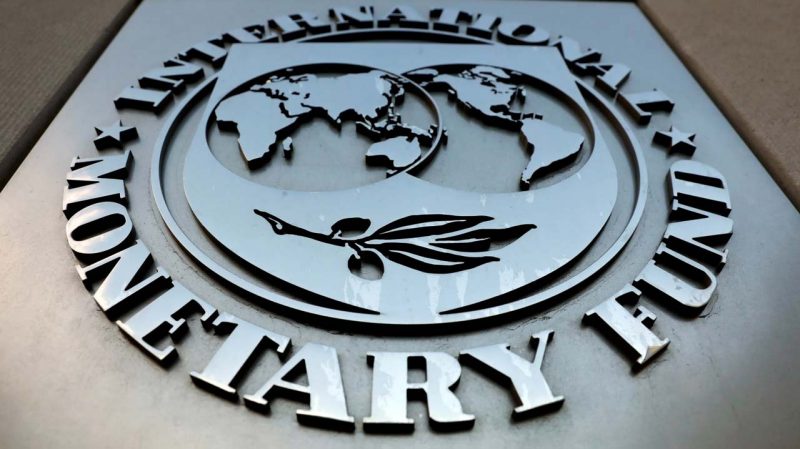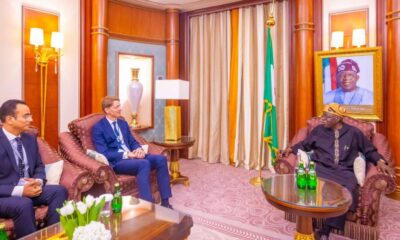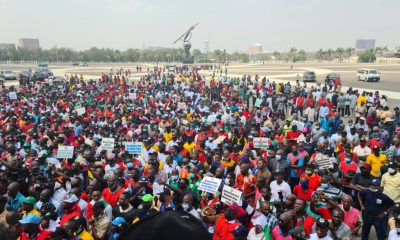Business
IMF Mission asks FG to remove fuel, electricity subsidies

The International Monetary Fund (IMF) Article IV Staff Mission has advised the President Muhammadu Buhari administration to completely discard with fuel and electricity subsidies in Nigeria.
This formed the highlight of the concluding statement of the Article IV staff Mission to Nigeria, released yesterday.
It said, “The complete removal of regressive fuel and electricity subsidies is a near-term priority, combined with adequate compensatory measures for the poor.
“The mission stressed the need to fully remove fuel subsidies and move to a market-based pricing mechanism in early 2022 as stipulated in the 2021 Petroleum Industry Act.
“In addition, the implementation of cost-reflective electricity tariffs as of January 2022 should not be delayed.”
The staff, however, called for a “Well-targeted social assistance” to cushion negative impacts on the poor particularly in light of still elevated inflation.
While projecting a fiscal deficit of as wide as 6.3 per cent of the Gross Domestic Product (GDP), the mission also advised the federal government to implement revenue-based fiscal consolidation.
READ ALSO:
- Gunmen kidnap ex-Imo deputy governor’s father
- 7 female Maulud celebrants drown as boat capsizes in Jigawa
- EndSARS: Controversy as panel members, govt clash over alleged technicalities, discrepancies in report
“The headline fiscal deficit is projected to worsen in the near term and remain elevated over the medium term.
“Despite much higher oil prices, the general government fiscal deficit is projected to widen in 2021 to 6.3 percent of GDP, reflecting implicit fuel subsidies and higher security spending, and remain at that level in 2022. There are significant downside risks to the near-term fiscal outlook from the ongoing pandemic, weak security situation and spending pressures associated with the electoral cycle.
“Over the medium term, without bold revenue mobilization efforts, fiscal deficits are projected to stay elevated above the pre-pandemic levels with public debt increasing to 43 percent in 2026.
“General government interest payments are expected to remain high as a share of revenues making the fiscal position highly vulnerable to real interest rate shocks and dependent on central bank financing,” the mission warned.
On the foreign exchange situation in the country, the staff observed that continued reliance on administrative measures to address persistent foreign exchange shortages was negatively impacting confidence. “The mission welcomed steps taken toward unification of the exchange rate and stressed the need for further actions. The discontinuation of the official exchange rate is a step in the right direction but continued dependence on administrative measures to address FX shortages sustains uncertainties and increases the risks of a sudden and large adjustment in the exchange rate.
READ ALSO:
- BREAKING: Hilton Hotel owner, Adedoyin, speaks from detention, says ‘I know nothing about OAU student’s death’
- N32bn debt: I’ll soon take over GTB, says Innoson boss
- BREAKING: Boko Haram kidnap 22 girls in Rafi, Niger for marriage
“Taking advantage of the favorable global conditions, improving current account and robust oil prices, the mission advised a move to a unified and market-clearing exchange rate without further delays. To preserve competitiveness, any exchange rate adjustment should be accompanied by clear communications regarding exchange rate policy going forward, macroeconomic policies to contain inflation and structural policies to facilitate new investment”
According to the mission “manufacturing and oil sectors remain weak, reflecting continued foreign exchange shortages, and security and technical challenges.”
The mission warned of significant downside risks to the near-term outlook arising from the uncertain course of the pandemic and the domestic security situation.
It added, “In the medium term, there are upside risks from faster-than-expected reaching of the Dangote refinery’s production capacity along with effective implementation of the 2021 Petroleum Industry Act in terms of higher manufacturing production and investment in the oil sector.”
On debt, the staff said that significant additional domestic revenue mobilization was critical to put the public debt and debt-servicing capacity on a sustainable path.
The mission advised, “The near-term priorities are to implement e-customs reforms including efficient procedures and controls, developing a VAT Compliance Improvement Program, improving compliance across large, medium, and micro/small taxpayers and rationalizing tax incentives and customs duty waivers.
“As the recovery gains strength and compliance improves, Nigeria will have to adopt tax rates comparable to its peers in the Economic Community of West African States (ECOWAS) to raise revenues to levels targeted in the 2021-25 National Development Plan.
READ ALSO:
- Troops kill 11 ISWAP terrorists in Borno
- Breaking: Reprive as railway workers call off strike
- Buhari to Igbo Leaders: I’ll consider your demand for Nnamdi Kanu’s release, but…
“The cumulative net savings from the recommended measures, after making room for additional social assistance to cushion impacts of reforms, could amount to 5.1 percent of GDP over 2022-26. Such a consolidation would keep public debt below 40 percent of GDP and reduce dependence on central bank financing of the deficit.”
The team welcomed the recent passage of the Petroleum Industry Act (PIA) and stressed its timely implementation, while expressing optimism that it would boost investment in the sector.
The Staff Mission Statement position requires management approval which would be presented to the Executive Board and approved before it becomes the position of the IMF.
Vanguard
Business
Naira depreciates again, trades at N1,402/$

Naira depreciates again, trades at N1,402/$
The Nigerian currency, naira, on Thursday slightly depreciated at the official market, trading at N1,402.67 to the dollar.
Data from the official trading platform of the FMDQ Exchange, a platform that oversees the Nigerian Autonomous Foreign Exchange Market (NAFEM), showed that the naira lost N11.71
READ ALSO:
- Why I killed my one-year-old son – Delta woman
- Bandits kill nine civilian JTF members, kidnap three in Sokoto
- Yahaya Bello govt spending third term in office through Ododo – Clark
This represents a 0.84 per cent loss when compared to the previous trading date on Tuesday April 30, when it exchanged at 1,390.96 to a dollar.
However, the total daily turnover increased to 232.84 million dollars on Thursday, up from 225.36 million dollars recorded on Tuesday.
Meanwhile, at the Investor’s and Exporter’s (I&E) window, the naira traded between 1,445.00 and N1,299.42 against the dollar.
Naira depreciates again, trades at N1,402/$
Auto
Appeal court takes over NURTW case as NIC withdraws

Appeal court takes over NURTW case as NIC withdraws
The National Industrial Court has withdrawn from a case involving Alhaji Najeem Usman Yasin, Board of Trustees chairman of the National Union of Road Transport Workers (NURTW), and Alhaji Tajudeen Ibikunle Baruwa’s ambition to return as president of the union over lack of jurisdiction.
The industrial court’s decision was made to avoid conflict with the Court of Appeal, where the matter is already being heard.
Before the NIC announced its decision to hands-off the case, the defendants’ counsel, Mr. O.I. Olorundare SAN, had informed the court that the matter is currently before the Court of Appeal, Abuja division, and that the industrial court could not continue to adjudicate on the same matter.
The counsel cited authorities to support his claim, adding that the National Industrial Court does not have concurrent jurisdiction with the Court of Appeal.
The presiding judge, O.O. Oyewunmi, struck out the case, stating that the Appeal Court had taken over the matter and that the Industrial Court must respect the hierarchy of courts.
Alhaji Yasin and six others took the case to the Appeal Court, challenging the decision of the industrial court recognising a delegates’ conference held on May 24, 2023, where Baruwa was proclaimed as President of the union for a second term in office.
With the latest NIC judgement, both parties will now proceed to defend their positions at the Court of Appeal and await the final judgement.
Business
Multichoice shuns court order, proceeds with increase of DSTV, Gotv packages

Multichoice shuns court order, proceeds with increase of DSTV, Gotv packages
Despite the intervention of the CCPT, Multichoice Limited has proceeded to increase packages price for DSTV and GOTV as announce on Wednesday last week.
Newstrends had earlier reported that the corporation announced that the new rates will go into effect on Wednesday, May 1, 2024, in a statement.
Meanwhile, on Monday, MultiChoice Nigeria Limited was ordered by the Competition and Consumer Protection Tribunal (CCPT) in Abuja to suspend the planned prices and tariffs hike on packages and services.
READ ALSO:
- Ogun frees 49 inmates to decongest prisons
- JAMB, NCC in talks to produce special SIM for students
- Labour-FG face-off imminent as NLC rejects new salary increase
The three-member tribunal, presided over by Saratu Shafii, gave the interim order following an ex-parte motion moved by Ejiro Awaritoma, counsel for the applicant, Festus Onifade.
News prices includes: DStv, Premium bouquet, the price moved from N29,500 to N37,000; Compact+ from N19,800 to N25,000; Compact from N12,500 to N15,700; Confam from N7,400 to N9,300, among others.
For GOtv users, Supa+ increased from N12,500 to N15,700; Supa moved from N7,600 to N9,600; Max from N5,700 to N7,200; Jolli, from N3,950 to N4,850, among others.
















